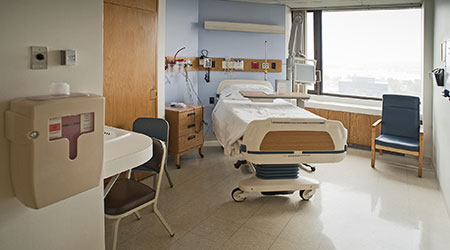
Sharon Jones, a member of the Environmental Services (ES) team at Northwest Indiana’s Methodist Hospitals, Gary Campus, has been named the 2015 recipient of the Hygiene Specialist Excellence award sponsored by UMF Corporation, a Chicago-based developer of high-performance infection-prevention products.
Jones, a resident of Gary, IN, was nominated for the award by her supervisor, Poet Billups, Manager of Environmental Services at Methodist Hospitals, a 600+-bed hospital system with campuses in Gary and Merrillville, IN.
The Hygiene Specialist Excellence award is in its seventh year. It was established by UMF Corporation to acknowledge the invaluable contribution of the unsung hero’s staffing ES departments across the country – the first line of defense – providing safe environments in hospitals and long-term care facilities, according to George Clarke, CEO of UMF Corporation.
Commenting on his nomination of Jones, Billups said, “Sharon’s primary job is to provide a clean, safe environment for patients, visitors and staff by minimizing the dangers posed by the spread of any infectious diseases and healthcare-associated infections (HAIs). In addition, Sharon also embodies what we call the Spirit of Methodist in her work and her actions. She does a tremendous job in the way she partners with nursing staff and in the compassion she shows to patients and their families.”
As a member of the ES team, Jones participated in a Hygiene Specialist In-Service Training program that included learning best practices for effective infection prevention, in-service education and effective hygiene management in patient rooms and all other areas of Methodist Hospitals.
The Hygiene Specialist Award includes a one-week vacation for two to South Beach, Florida. (Note: 2016 award nominations are being accepted here.)
Hygiene Specialists: The ‘Secret Weapon’ in Reducing, Preventing HAIs
Though mostly preventable, HAIs like Clostridium difficile (C. diff) and Methicillin-resistant Staphylococcus Aureu (MRSA) can, and do occur in all types of patient and resident care settings, Clarke said.
According to the Centers for Disease Control (CDC), on any given day, about one in 25 hospital patients has at least one healthcare-associated infection. CDC Director Tom Frieden has said, “Today and every day, more than 200 Americans with healthcare-associated infections will die during their hospital stay.” This does not include long-term care,
“Sharon Jones and all the other dedicated ES individuals – Hygiene Specialists just like her – have been called ‘the secret weapon’ in reducing and preventing HAIs in the healthcare setting and providing a safe environment,” Clarke said.
He cited several instances of the role of ES in patient safety:
• A 2013 study published in BMC Infectious Diseases that found that environmental cleaning should be considered an integral component of MRSA infection control in hospitals. "Given the previously under-appreciated role of surface contamination in MRSA transmission," the researchers wrote, "this intervention mode can contribute to an effective multiple barrier approach in concert with hand hygiene."
• A report in USA Today on Jewish Hospital-Mercy Health in Cincinnati, which was experiencing an unusually high incidence of C. diff, a potentially fatal form of diarrhea. The hospital managed to half the rate within six months, with hospital officials crediting new environmental cleaning practices as a significant factor in reducing these infections.
• A study in the Society of Healthcare Epidemiology of America that found that a dedicated cleaning crew that adequately cleans and disinfects rooms contaminated by C. diff using a standardized process can be more effective than other disinfection interventions.
• And in a hospital near Chicago, environmental services and hygiene played a significant role in in lowering infections and improving patient satisfaction on the important Cleanliness of the Hospital Environment of the federal government’s Hospital Consumer Assessment of Healthcare Providers and Systems (HCAHPS).
“Enlightened management at facilities like these and at Methodist Hospitals has recognized the importance of ES as part of an enterprise-wide multimodal intervention plan to combat these infections,” Clarke said. “Clearly, these dedicated individuals are invaluable and deserve recognition.”

 The Down and Dirty on Cleaning in Virus Season
The Down and Dirty on Cleaning in Virus Season How Surfactant Use is Expanding in Commercial Cleaning
How Surfactant Use is Expanding in Commercial Cleaning Clean Buildings Conference
Clean Buildings Conference